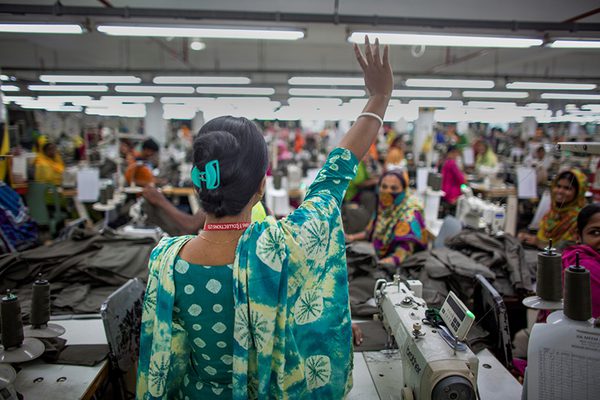New Construction Sector Agreement on Protecting Vulnerable Workers
11 October 2017

Worker exploitation and ongoing rights abuses in the construction sector are being tackled through a range of initiatives, including guidance from CIOB on tackling modern slavery in construction, the BRE Ethical Labour Standard, and the Stronger Together Construction Toolkit.
These tools - important first steps in improving standards and tackling modern slavery - are industry-led and rely on voluntary uptake and compliance.
This means ongoing monitoring, public reporting, and active stakeholder involvement will be needed to ensure effective implementation.
A number of leading UK-based construction companies, trade associations and professional bodies are moving along a similar path by signing a new voluntary information sharing agreement with the Gangmasters and Labour Abuse Authority.
A number of leading UK-based construction companies, trade associations, and professional bodies are moving along a similar path by signing a new voluntary information sharing agreement with the Gangmasters and Labour Abuse Authority (GLAA).
This ‘Construction Protocol’ will see signatory companies commit to working in partnership with the GLAA to help prevent forced labour, trafficking, and other forms of exploitation taking place on British building sites.
The Need for Effective Enforcement
This new initiative provides a timely opportunity to review the impacts of recent UK anti-slavery legislation and the need for effective enforcement.
The licensing and oversight of labour providers also illustrates, as clearly expressed in the UN Guiding Principles on Business and Human Rights (UNGPs), the importance of both states and business undertaking their respective roles in protecting and respecting human rights.
The GLAA (previously known as the Gangmasters Licensing Authority), was established in 2006 to regulate agencies supplying staff to agricultural, horticultural, shellfish harvesting, and related occupations. All labour agencies operating in these sectors were required to hold a licence, and it became illegal for end-users in the sector to use the services of an unlicensed agency.
Ongoing monitoring, public reporting, and active stakeholder involvement will be needed to ensure effective implementation.
Licensing enabled checks on agencies to ensure practice in line with both licensing requirements and labour law.
For businesses operating in the sector, it continues to provide a simple way of ensuring that agencies they contract are operating within the law, and are protecting not only workers but also brands from reputational damage.
In particular, the licensing system has the backing of the major UK supermarkets and responsible businesses for whom it provides clear operating criteria and a level playing field that can protect them from having to compete with those who might operate illegally.
Persistent Scope for Exploitation
Although generally viewed as a success, this licensing system has remained an anomaly.
Outside of the tightly licensed environment found in agricultural and horticultural operations, agencies supplying staff to other industry sectors, including those equally at risk of worker exploitation such as construction, hospitality, and care, faced no licencoing or even registration requirements. There were few safeguards or checks on those agencies, and the Employment Agency Standards Inspectorate (ostensibly responsible for all agencies outside the GLA sectors) was poorly resourced and perceived as largely ineffective.
We at IHRB, together with many others, have repeatedly called for the licensing of employment agencies under the GLAA to be extended to other sectors.
This has meant that the scope for exploitation and abuse to go unchecked has persisted.
In competitive operating environments with little regulation or oversight, it remains the case that the rights and working conditions of workers (particularly those employed on an agency-only basis) are being squeezed. This includes: discrepancies around wages, tax, national insurance, holiday and sick pay; the use of compulsory (tied) accommodation; unattainable work expectations; compulsory availability for work or overtime; bogus (forced) self employment; and at the most extreme end, clear examples of debt bondage and forced labour.
In many sectors including construction, hospitality, and care - particularly those with outsourced staffing arrangements and especially for casual, temporary, and low wage workers - lack of effective union representation or collective bargaining agreements further compromises their ability to assert their rights.
We at IHRB, together with many others, have repeatedly called for the licensing of employment agencies under the GLAA to be extended to other sectors.
There is a prevailing orthodoxy that regulation can stifle and hold back business. Yet many companies are in favour of safeguarding their engagement with labour providers by extending the licensing regime. Indeed, the UNGPs explicitly state that:
“States should not assume that businesses invariably prefer, or benefit from State inaction, and they should consider a smart mix of measures, national and international, mandatory and voluntary to foster business respect for human rights.”
A Pro-Regulation Position from Business
Such a “pro-regulation” position from business on labour rights issues is not unprecedented.
It was very clearly delivered to the UK Government in 2014 during the consultation on the UK Modern Slavery bill. Orchestrated by the Ethical Trading Initiative and the British Retail Consortium, a large group of leading companies, including many household names, called for more, not less regulation.
They noted the limitations of the Government’s preferred method of achieving compliance through voluntary initiatives and made clear their support for both the extension of the GLA remit and compulsory transparency reporting requirements in any new legislation.
Orchestrated by the Ethical Trading Initiative and the British Retail Consortium, a large group of leading companies, including many household names, called for more, not less regulation.
As an outcome of this process, the Modern Slavery Act of 2015 did indeed include compulsory transparency reporting requirements. It could go some way further by reducing the turnover threshold at which companies are required to report, and by ensuring real sanctions are applied to companies that do not report.
At the same time, the GLAA has also been allocated additional resources and an extended remit to oversee other sectors such as construction.
Licensing however has not been extended. This is a missed opportunity to develop a robust proactive enforcement process that would truly enable the GLAA to oversee the recruitment and employment industry across all sectors.
The launch of the GLAA Construction Protocol is another step forward for the construction sector, but properly protecting workers cannot be achieved through purely voluntary initiatives.
For every compliant business doing its best to ensure it is not complicit in modern slavery, there is another either unaware of exploitation or unwilling to address it. Such unscrupulous operators exploit workers and undercut those who operate within the law.
Licensing all those seeking to supply workers to any industry sector could ensure real protection for both workers and for responsible business.
For every compliant business doing its best to ensure it is not complicit in modern slavery, there is another either unaware of exploitation or unwilling to address it.





